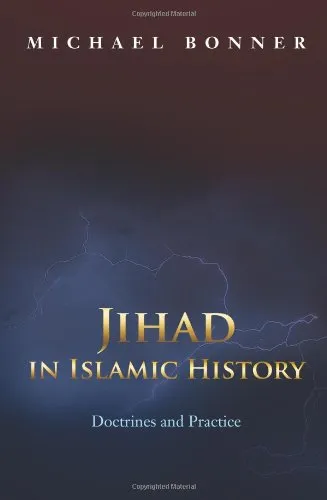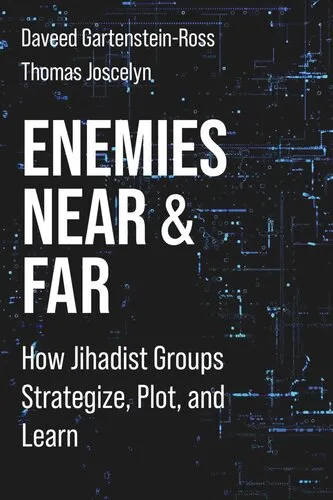Jihad in Islamic History: Doctrines and Practice
4.5
بر اساس نظر کاربران

شما میتونید سوالاتتون در باره کتاب رو از هوش مصنوعیش بعد از ورود بپرسید
هر دانلود یا پرسش از هوش مصنوعی 2 امتیاز لازم دارد، برای بدست آوردن امتیاز رایگان، به صفحه ی راهنمای امتیازات سر بزنید و یک سری کار ارزشمند انجام بدینکتاب های مرتبط:
معرفی کتاب "Jihad in Islamic History: Doctrines and Practice"
کتاب "Jihad in Islamic History: Doctrines and Practice" نوشته مایکل بونر یکی از منابع معتبر و جذاب در زمینه فهم معنای جهاد در تاریخ اسلامی است. این کتاب با استفاده از متون اصلی اسلامی و تحلیلهای تاریخی، به واکاوی مفاهیم، اصول و شیوههای اجرای جهاد در فرهنگ و تمدن اسلامی میپردازد. اثر حاضر بهخصوص برای کسانی که به دنبال درک عمیقتر از زمینههای تاریخی و ایدئولوژیک جهاد هستند، بسیار مناسب است.
خلاصهای از کتاب
این کتاب به بررسی چگونگی شکلگیری مفهوم جهاد در قرآن، حدیث، و دیگر متون اولیه اسلامی میپردازد. مایکل بونر با نگاه دقیق به تاریخ، نشان میدهد که چگونه این مفهوم در قرنهای مختلف تغییر شکل داده و تحت تأثیر عوامل اجتماعی، سیاسی و اقتصادی قرار گرفته است. او میان جهاد بهعنوان یک مفهوم مذهبی و عملی بهعنوان توجیهی برای گسترش سیاسی-نظامی تمایز قائل میشود. هدف اصلی کتاب، ارائهی دیدگاهی متوازن و مبتنی بر متون برای بررسی تعامل بین جهاد بهعنوان یک وظیفه دینی و نقش آن در جهان واقعی است.
در بخشهای مختلف این کتاب، نویسنده به موضوعات مهمی از جمله ارتباط جهاد با مفاهیمی نظیر صلح و دفاع، تأثیر آن بر دیپلماسی و سیاست، نقش جهاد در گسترش خلافت اسلامی و واکنش مسلمانان به تحولات تاریخی میپردازد.
اصول کلیدی و نکات آموزنده
- تاریخچهی جهاد در قرآن و سنت
- تحلیل مفهوم جهاد دفاعی و تهاجمی
- ارزیابی نقش اقتصادی و سیاسی جهاد در گسترش تمدن اسلامی
- مقایسه مفهوم جهاد با جنگهای مقدس در ادیان دیگر
- پاسخ مسلمانان به انتقادات مدرن پیرامون جهاد
در مجموع، این کتاب به خوانندگان کمک میکند تا نگاهی جامعتر به تاریخ جهاد در اسلام داشته باشند و با درک واقعبینانهتر از این مفهوم، به تحلیل وقایع معاصر بپردازند.
جملات معروف از کتاب
"The term jihad, while often associated with acts of war, has historically carried a complex and multifaceted set of meanings within Islamic thought."
"Understanding jihad requires not only studying theology but also exploring the socio-political contexts within which it evolved."
چرا این کتاب اهمیت دارد؟
کتاب "Jihad in Islamic History: Doctrines and Practice" از جهات مختلف یک منبع ضروری برای پژوهشگران، دانشجویان تاریخ اسلام و حتی فعالان اجتماعی و سیاسی است. این کتاب به شکلی علمی و بیطرفانه، مفاهیم مرتبط با جهاد را بررسی میکند و به خوانندگان کمک میکند به جای قضاوتهای سطحی و کلیشهای، به حقیقت و تاریخ این پدیده پی ببرند. با رشد مباحث پیرامون نقش اسلام در دنیای مدرن، این کتاب میتواند راهنمای مهمی برای درک بهتر جهان اسلام و تحولات آن باشد.
مایکل بونر با قلمی روان و تحقیقی موشکافانه، شکاف میان شرق و غرب را در مورد درک مفهوم جهاد پر میکند و زمینهای برای گفتوگوهای سازنده فراهم میسازد. این کتاب بهویژه در دنیای امروز که دچار سوءتفاهمهای فرهنگی و مذهبی زیادی است، میتواند به عنوان پلی برای درک متقابل عمل کند.
Introduction to "Jihad in Islamic History: Doctrines and Practice"
Understanding the concept of jihad is essential to comprehending the rich and complex history of Islam. In my book, Jihad in Islamic History: Doctrines and Practice, I delve deeply into one of the most misunderstood aspects of Islamic tradition — the doctrine and practice of jihad. By exploring its historical, religious, and cultural dimensions, the book invites readers to move beyond oversimplified stereotypes and examine jihad within its proper intellectual and historical context.
Jihad, often translated as "struggle" or "striving," has been subjected to many interpretations throughout Islamic history. My work focuses on the evolution of this concept: its foundational roots in classical Islamic teachings, its application over time, and its multifaceted role in shaping the Islamic world. With an emphasis on both doctrine and practice, I aim to provide a balanced and scholarly exploration of how Muslims, both historically and in more contemporary settings, have understood and engaged with this pivotal concept.
Summary of the Book
The book is structured to provide a nuanced exploration of jihad across various historical and doctrinal contexts.
The opening chapters provide readers with a grounding in the Quranic and early Islamic sources about jihad. These explore the scriptural roots of the concept, its moral and spiritual dimensions, and the early historical context in which jihad first emerged during the life of the Prophet Muhammad and the subsequent generations.
Further chapters discuss the development of legal and theological frameworks around jihad as Islam expanded its geographic and cultural reach. Through these sections, readers can understand how Islamic jurists and scholars envisioned jihad, not merely as warfare but also as a personal striving toward moral and spiritual betterment.
In later chapters, I examine more modern interpretations of jihad in response to colonialism, the emergence of nation-states, and evolving political theories. The book also carefully analyzes how jihad has been appropriated or misinterpreted in the modern era, especially in the geopolitical context of the 20th and 21st centuries. I unravel how some interpretations have contributed to violence, while others have retained the broader spiritual and ethical vision of Islamic tradition.
Key Takeaways
- Jihad has deep, diverse meanings in Islamic tradition, ranging from spiritual struggle to physical defense.
- The Quran and early Islamic texts establish frameworks for both the ethics of warfare and the personal dimensions of jihad.
- Islamic scholars across centuries have deliberated extensively on the rules, motives, and applications of jihad.
- The concept of jihad has evolved significantly, shaped by historical changes, cultural encounters, and political transformations.
- Simplistic portrayals of jihad in modern discourse often neglect its layered history and spiritual aspects.
Famous Quotes from the Book
"Jihad is not uniformly or exclusively about violence; it signifies a rich and meaningful struggle, whether personal, spiritual, or social."
"To understand jihad requires the willingness to confront its complexity rather than reducing it to preconceived notions."
"The legal and ethical doctrines surrounding jihad demonstrate the thoroughness with which Islamic scholars sought to balance justice and power."
Why This Book Matters
In a world where misunderstandings about Islam persist, this book offers a vital contribution to both scholarship and public discourse.
Studying jihad is not just about unraveling a historical or religious concept; it is about understanding one of the most critical ideas that have shaped the Islamic world and continue to impact global geopolitics today. Through a careful study of classical doctrines and historical practices, the book invites readers to think critically about the meanings and applications of jihad across time.
At the heart of the book is the belief that nuanced scholarship can combat stereotypes and foster more informed conversations about contentious topics. By reading this book, scholars, students, and curious readers alike will gain tools to better understand Islam, its history, and the diverse ways in which Muslims have interpreted their faith and their obligations.
In an age where simplistic interpretations of jihad dominate headlines and public opinion, the need for a deeper, evidence-based analysis is more urgent than ever. This is precisely what Jihad in Islamic History: Doctrines and Practice strives to achieve.
دانلود رایگان مستقیم
You Can Download this book after Login
دسترسی به کتابها از طریق پلتفرمهای قانونی و کتابخانههای عمومی نه تنها از حقوق نویسندگان و ناشران حمایت میکند، بلکه به پایداری فرهنگ کتابخوانی نیز کمک میرساند. پیش از دانلود، لحظهای به بررسی این گزینهها فکر کنید.
این کتاب رو در پلتفرم های دیگه ببینید
WorldCat به شما کمک میکنه تا کتاب ها رو در کتابخانه های سراسر دنیا پیدا کنید
امتیازها، نظرات تخصصی و صحبت ها درباره کتاب را در Goodreads ببینید
کتابهای کمیاب یا دست دوم را در AbeBooks پیدا کنید و بخرید



